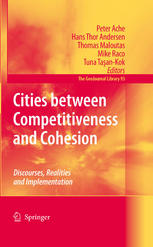

Most ebook files are in PDF format, so you can easily read them using various software such as Foxit Reader or directly on the Google Chrome browser.
Some ebook files are released by publishers in other formats such as .awz, .mobi, .epub, .fb2, etc. You may need to install specific software to read these formats on mobile/PC, such as Calibre.
Please read the tutorial at this link: https://ebookbell.com/faq
We offer FREE conversion to the popular formats you request; however, this may take some time. Therefore, right after payment, please email us, and we will try to provide the service as quickly as possible.
For some exceptional file formats or broken links (if any), please refrain from opening any disputes. Instead, email us first, and we will try to assist within a maximum of 6 hours.
EbookBell Team

4.0
56 reviewsThe book is the result of a COST Action financed by the European Science Foundation. It analyses the key concepts, ideas and processes driving competitiveness and cohesion agendas across Europe and demonstrates the implications and the effects of contemporary urban regeneration policies and politics in Europe. The case study material ensures that an in depth understanding of policy processes is conveyed to readers, and attention is drawn to the problems and paradoxes of policy, but also to the possibilities for policy innovation and learning across national and disciplinary borders. The material a.o. studies the cities of Amsterdam, Antwerp, Athens, Bratislava, Istanbul, Maribor, London, Rotterdam, Vienna, and Zurich. Specific policy fields which are looked at relate to housing, labour markets, enterprises, integration of ethnical groups, urban regeneration, or transport. The book shows that spatial and urban policy continues to be a key site of policy intervention and experimentation. Different national welfare systems, political cultures, and socio-economic conditions combine and recombine to address policy problems and opportunities. Collectively, the authors argue that the examined policy initiatives reflect and reproduce these broader changes and shifting ways of thinking about the appropriate relationships between citizens, businesses, and the state.